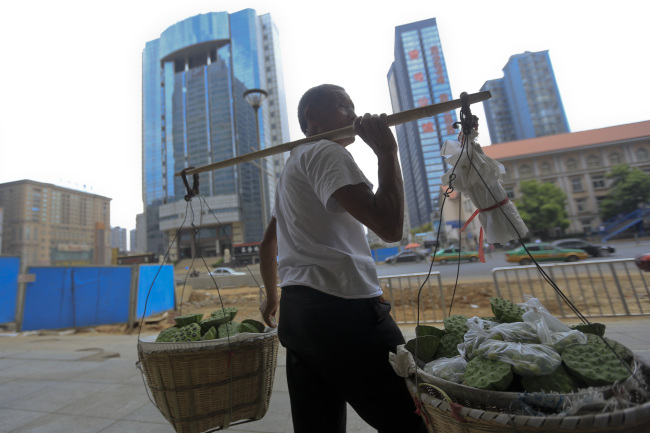China’s growth may slide to 7.4 percent this quarter from a year earlier, an adviser to the nation’s central bank said, underscoring Premier Wen Jiabao’s warning that the economy’s difficulties may “persist for a while.”
The possibility of a “short period” of deflation in the world’s second-largest economy can’t be ruled out, Song Guoqing, an academic member of the People’s Bank of China monetary policy committee, said at a forum in Beijing Saturday.
China’s expansion slowed to 7.6 percent in the three months ending June, the sixth straight deceleration, as Europe’s fiscal crisis sapped exports and a crackdown on property speculation curbed domestic demand. Wen said the momentum for a recovery in growth isn’t yet in place, according to a July 15 Xinhua News Agency report, and warned two days later that the labor situation will become more “severe.”
 |
A vendor selling produce stands in downtown Changsha, China. (Bloomberg) |
“The slowdown in growth could worsen in the second half if Beijing is not decisive in unwinding some outdated tightening measures and carrying out effective stimulus,” Lu Ting, a China economist at Bank of America Corp. in Hong Kong, said in a July 19 note. The government should introduce measures equivalent to 1 percent of gross domestic product, about 470 billion yuan ($74 billion), “to fill the gap generated by slowing exports and fixed-asset investment,” he wrote.
The government will be “prudent” with any stimulus, Song said at Saturday’s forum held by Peking University’s China Center for Economic Research.
“Prudence can be good as it can avoid big swings,” Song said. “But in an economic slowdown it may also lead to insufficient measures.”
Signs of weakening domestic demand include falling factory- gate prices and softening inflation. The producer price index dropped 2.1 percent in June from a year earlier, the fourth straight decline, while consumer prices rose 2.2 percent, the smallest increase since January 2010.
“Deflation is already a fact for the corporate world,” Song said.
Angang Steel Co., China’s largest Hong Kong-traded producer of the alloy, said July 6 that it probably swung to a loss in the first half after prices plunged. The cost of steel fell this month to the lowest in two years.
Moderating inflation has given the central bank more room to ease monetary policy. It announced the second reduction in interest rates in a month on July 5 and has lowered the proportion of deposits banks must set aside as reserves three times since it started cuts in November to boost lending.
The central bank is “very likely” to further cut banks’ reserve-requirement ratio, Song said Saturday, without saying when he expects an announcement. It is “very difficult to make a forecast” on interest rates as the PBOC needs to look at “timing and conditions,” he said.
(Bloomberg)








